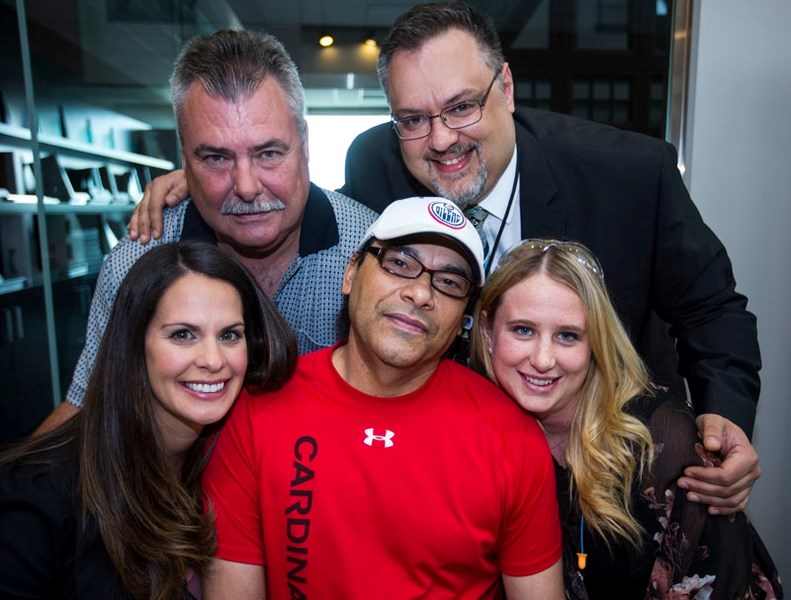Fortune favours the prepared. If you don’t believe that, Manny Rodriguez will convince you.
Only two months ago, four co-workers saved his life when he had a sudden heart attack at All Weather Windows. The business has an on-site registered nurse and automated external defibrillator (AED) stations. All four workers were CPR trained.
“I owe them my life. My doctors said I’m alive because they reacted so quickly,” the 53-year-old said of his colleagues, praising his luck.
“It could have happened to me on the road. It could have happened to me here late at night when not too many people are here. It happened right before they left. They all responded quick. They all went into action right away. They saved my life.”
The four co-workers – Dale Moan, Nilos Korodimas, Rebekah Butler, and nurse Beth Marsh – were each acknowledged by Alberta Health Services on Thursday with a Citizen Recognition Award for their quick action.
Moan, of St. Albert, was surprised to learn that those old CPR skills might fade with time but they never disappear.
“I had training years and years ago. Of course, you never use it and forget about it. You’re never really sure what to do. You just do what your instincts tell you. It’s a chain reaction.”
Graeme McAlistair, the associate executive director of Emergency Medical Services in Edmonton, emphasized how each second counts.
“When somebody goes into cardiac arrest, the clock starts ticking. It’s literally a race against life and death. The actions of those around you make that difference.”
Rodriguez remembers nothing of the event, but it was a flurry of fast action. As soon as he collapsed, one person grabbed the company’s emergency crash bag of medical supplies plus the AED while one person called 9-1-1. Two of the co-workers began CPR, employing the AED twice to restart Rodriguez’s heartbeat while the two others controlled the scene and ushered in the paramedics who arrived within several minutes to rush him to the hospital.
His hospital stay lasted a few weeks and he has been recuperating at home ever since. He expects to return to work in mid-August. “My heart’s doing good,” he said.
“It’s such a shining example of what happens when all those pieces fall into place correctly. When someone has a cardiac arrest, their chances of survival decrease every minute by about 10 per cent that they go without CPR or defibrillation,” explained Alex Campbell, public education officer with Alberta Health Services.
He said regular practice with AEDs and CPR recertification is important to keep those skills sharp.
“It’s very common for facilities such as this to have quarterly fire drills and schools practice it. What we’re not seeing is people practicing and really knowing and understanding their emergency medical procedures.”
AEDs can be registered with www.heart-safe.ca so that a dispatcher can direct people to the actual physical location of the device and also help coach its use. AEDs are considered mostly foolproof.
“It’s as simple as turning the machine on, putting two sticky pads on someone’s chest, and then following the directions that the AED says. That’s all you need to do to be able to save someone’s life,” Campbell said.
All Weather Windows is a large glass manufacturer located in Edmonton’s west end and recently won the Canadian Home Builders’ Association Alberta Safety Leadership Award. President Richard Scott has his first aid and CPR training too and prides his company on its safety record, joking, “We always talk about how you came here with 10 fingers and 10 toes and we expect you to go home with them too.”
“Our company is built on people so it’s our biggest investment. We want to make sure we look after it,” the St. Albert resident said.
Statistics from the Heart and Stroke Foundation show that current survival rates for cardiac arrests outside of a hospital are five per cent. For each minute without intervention, the chance of a victim being revived drops by up to 10 per cent. Resuscitation is rarely successful after 10 minutes.
“Their preparedness and immediate response undoubtedly saved Manny’s life. Saving the life of someone in cardiac arrest is a team effort. Early bystander CPR is the critical link in the chain of survival.”
The company has already installed a second AED and has a plan to build on its emergency drills in order to improve its on-site health and safety status.




